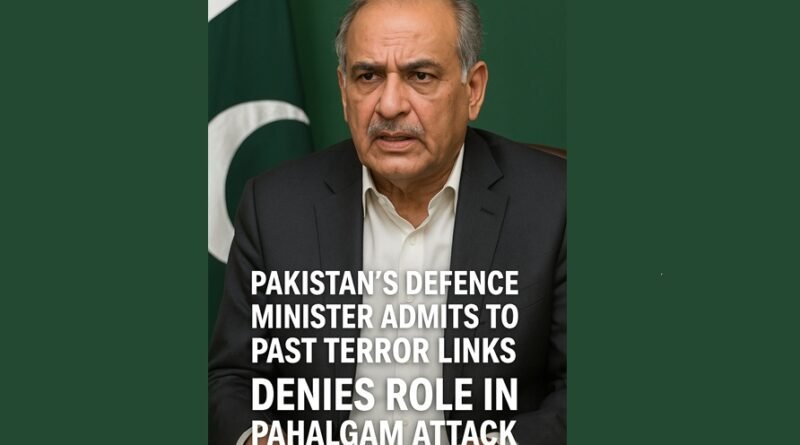Pakistan’s Defence Minister Admits Past Terror Links, Denies Involvement in Pahalgam Attack
April 25, 2025 | New Delhi/Islamabad — In a moment of rare political candor, Pakistan’s Defence Minister Khawaja Asif has publicly acknowledged that Islamabad supported militant groups in the past—allegedly at the behest of Western powers. The admission comes amid heightened tensions following the Pahalgam terror attack in Jammu and Kashmir that killed 26 tourists and injured dozens more.
Historic Admission Amid Crisis
Speaking at a press conference on Thursday, Asif stated:
“We did the dirty work for the United States for three decades. It was a part of our foreign policy dictated by global alliances during the Cold War era.”
He admitted that Pakistan’s intelligence agencies were deeply involved in supporting and financing militant outfits, characterizing these actions as a strategic necessity shaped by foreign influence, particularly during the Cold War. Asif’s statement marks a rare official acknowledgment of Pakistan’s long-suspected ties to terrorism in South Asia.
Denial of Role in Pahalgam Attack
Despite the admission, Asif categorically denied any Pakistani role in the recent terror attack in Pahalgam, alleging that India was attempting to frame Pakistan for internal political gains.
“It’s a false flag operation meant to distract from domestic unrest,” he claimed.
He further pointed to internal conflicts in Manipur, Chhattisgarh, and Nagaland, suggesting that the violence in Kashmir reflects a broader pattern of internal dissent within India.
India’s Stern Response
The Indian government has responded swiftly and firmly:
- Revoked visas for Pakistani nationals
- Suspended key diplomatic channels
- Announced a review of the Indus Waters Treaty, a pivotal water-sharing agreement between the two countries
In a retaliatory move, Pakistan has:
- Closed its airspace to Indian aircraft
- Suspended visa issuance for Indian citizens
These steps mark a sharp deterioration in India-Pakistan relations, raising alarms across diplomatic corridors worldwide.
Global Concern and Calls for Restraint
The ongoing escalation between the two nuclear-armed neighbors has triggered widespread concern among global powers. Several countries and international bodies have urged both nations to:
- Exercise restraint
- Resume dialogue
- Avoid further destabilization in the already fragile South Asian region
Strategic Implications and Regional Risk
Analysts say that Asif’s remarks could reshape international perceptions of Pakistan’s historic role in regional militancy, but they also highlight the fragile and dangerous state of South Asian geopolitics.
While some see his admission as a step toward transparency, others view it as a tactical move to deflect criticism over current events. Regardless, the denial of involvement in the Pahalgam attack has failed to quell calls for accountability from India and the global community.
“Without meaningful diplomatic engagement, the situation could spiral into a larger conflict,” warned a South Asia expert at a regional think tank.
Conclusion
As diplomatic ties fray and military posturing increases, the region stands at a critical crossroads. The international community watches closely, hoping that dialogue, not confrontation, will prevail in one of the world’s most volatile nuclear flashpoints.

